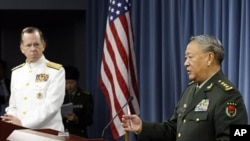The United States and China held their highest-level military talks in seven years this week in Washington, during the visit of the chief of staff of the People's Liberation Army, General Chen Bingde. While military ties between the two countries have long lagged behind stronger relations in business and other areas, and pointed differences of view remain, the two sides say the frank talks have helped build understanding.
Getting military-to-military ties more in tune with each other's views and interests was one of the main objectives of talks and exchanges this week between the U.S. and China. In addition to a joint performance by the two countries' bands, there were in-depth discussions between General Chen and his U.S. counterpart, Admiral Mike Mullen, chairman of the Joint Chiefs of Staff.
"I think the opportunity that is presented by virtue of us meeting and having these discussions is to validate our assumptions about each other," he said.
The threat that China's growing military might poses to the United States and other countries in the Asia-Pacific region is one big concern, and an area where assumptions differ.
General Chen dismissed such concerns at a news conference at the Pentagon Wednesday. He said a 20-year gap exists between the U.S. and Chinese militaries.
"Through my visits in the United States over the past couple days, I have been surprised by the sophistication of the U.S. military and its weapons and doctrines and so on," he said. "I can tell you that China does not have the capability to challenge the United States."
U.S. arms sales to Taiwan are a key issue of contention that General Chen raised, as well as the need for the U.S. to respect what China calls its "core interests."
China regards the self-ruled island as part of its own territory, and Chen repeated at the news conference that China would use force, if necessary, to ensure that the two unify.
However, General Chen said the fruits of these talks far outweigh the challenges.
"As I see it, cooperation is the mainstream between our two countries and two militaries," said General Chen. "We share a broad consensus on some major issues. Certainly we disagree on some other issues."
China froze military ties for most of 2010 after the United States approved a $6.4 billion arms deal with Taiwan. But in January of this year, Defense Secretary Robert Gates visited China, and relations appear to be on the mend.
Still, the United States is reviewing a proposed deal to sell Taiwan advanced F-16 fighter jets. General Chen said that if the deal is approved, it will definitely have an impact on U.S. China relations.
Admiral Mullen says Chen invited him to visit China during their talks and that he plans to do so in the near future. During their talks, the two sides agreed to hold a disaster and humanitarian relief exercise next year as well as boost maritime cooperation including holding a counter-piracy exercise.
US, China Seek Harmony in Military Ties




